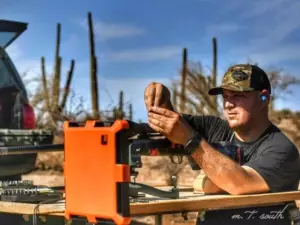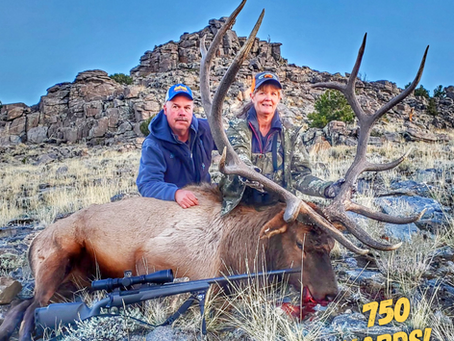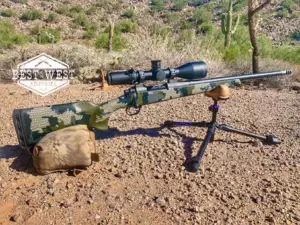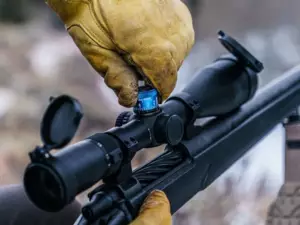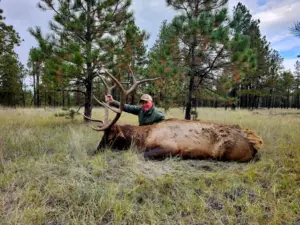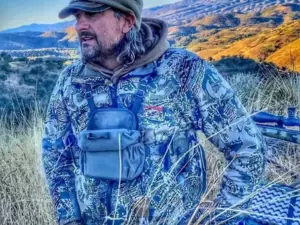Why are we still discussing the ethics of long-range hunting? Good question! Why is it that most of the criticism surrounding the practice of long-range hunting comes from fellow hunters?! Another great question!
I decided to cover this topic following a presentation I delivered on this very subject at the SCI (Safari Club International) conference in Nashville last week. The seminar was well attended by both men and woman who, as best I could determine, are long-range hunting enthusiast. Those in the class who haven’t hunted long-range before were particularly interested in someday doing so. Seminars I’ve hosted in the past were also largely attended by hunters engaging in the sport, however it isn’t uncommon to encounter someone who has strong feelings against the practice.
Occasionally, I encounter barriers even within the hunting industry regarding long-range hunting. For example, one author I spoke to recently was interested in writing an article about our long-range systems but his editor would not allow any mention of hunting/shooting at distances beyond 400 yards – a random self-imposed “ethical” limit. Despite these biases, I think I can make a pretty good argument for long-range hunting as an principled means of harvesting big game.
To set the stage, long-range hunting refers to the practice of hunting game animals from a distance of several hundred yards, often using specialized equipment such as high-powered rifles and specially designed optics. While long-range hunting can be an effective way to harvest game, it comes with its share of criticism.
Long-range hunting is an endeavor born out of necessity in the big expanses of the western U.S. Hunters sought to be more accurate and consistent in their shooting so they could capitalize on their investment of time, energy and effort when hunting wide-open and often rugged terrain. Over time, hunters went afield with more proficient systems featuring high quality rifle components and larger more capable optics to ensure fast and efficient harvests.
One of the main ethical concerns with long-range hunting is the potential for poor shot placement which could result in a wounded animal. Hunting at longer ranges requires significant skill and experience as well as a comprehensive understanding of ballistics and environmental conditions but even with these factors in place, there is a risk of error.
With that said, I’d ask you to go back and reread the last paragraph but this time replace the term “long-range” with whatever weapon or circumstance you choose. Archery, muzzleloader, rifle hunting through dense vegetation, even handgun hunting, and tell me if the same risks apply. Is there not the potential for poor shot placement when using all these weapons? Is there not a risk of wounding game when hunting from a tree stand with a bow or still hunting with a rifle through thick forests?
These are rhetorical questions of course as we all intuitively know, regardless of weapon or terrain, hunting is a challenging endeavor and the potential for wounding game is always present. No one likes to see an animal suffer needlessly which is why this can be an emotional subject; however, I believe that it’s every ethical hunters’ goal to harvest animals as quickly and cleanly as possible to minimize pain and suffering. No rational human being wants to see an animal suffer.
Whether you’re tracking big bucks through the evergreen swamps of upstate Maine or hunting from a platform above an Illinois corn field or shooting across a rugged Utah canyon, there’s always the potential for a bad shot. Regardless of weapon or the style of hunting, sportsmen and woman have a moral obligation to the game they purse to achieve a high degree of competency with their weapon and know how to use it in a variety of circumstances and conditions. This responsibility further extends to only taking shots within your limits and abilities. For instance, an archer who trains and is proficient to 60 yards but then takes an 80-yard shot in the heat of the moment may be just as guilty of being “unethical” as any long-range hunter who likewise attempts a shot outside their effective range.
Whether we’re talking about archers using modern day compound bows or hunters still hunting with rifles through dense cover or the hunter traversing big country where shots beyond 200 yards are probable, there are some straight up killers among us. You know these people too. They’re super proficient with their weapons and they experience higher than average success rates when hunting. For many of these hunters they’ve turned their attention over the years to trophy hunting and the challenge of taking mature older-age-class animals as a means of leveling the playing field. Their skill and proficiency has enabled them to hunt the most challenging of game animals and yet they still prevail and tag out with great frequency. This caliber of hunter exists in all classes and categories of hunting and we shouldn’t assume for a moment that only one type of hunter is more ethical, more skilled, more proficient or otherwise more capable than another.
I once heard an industry professional whom I respect greatly suggest during a podcast that only 10% of hunters on any given public land hunt are what he called, “killers”. While many more may be successful, he was pointing out that only a small percentage of hunters are so skilled with their weapon that they pose a serious threat to their prey every time they leave camp. To his point, I would argue that there are just as many highly skilled and proficient long-range hunters per capita as there are skilled archers hunting out of tree stands or hunters using primitive weapons such as muzzleloaders or long bows. I also think there’s proportionately just as many bad actors out there who have no business hunting any animal with any weapon.
I feel that most who are quick to criticize long-range hunting don’t truly understand what it’s all about. For example, there are many places in this country where, due to vegetation and terrain, hunters rarely encounter a deer or elk beyond 80 yards, and a 100-yard shot (even with a rifle) would be a “long” shot by comparison. For some of these individuals the idea of a 400- or 500-yard shot on an animal can be inconceivable. Until you’ve actually set foot in big country like we have out west one might never fully appreciate the challenges and opportunities western hunters experience during a hunt.
My own father who lives back east and hunts densely wooded forests for whitetail deer cannot fathom encountering deer and elk at long ranges. It doesn’t compute for him that these critters can actually detect you from several hundred yards away. Many hunters cannot conceive that 500 yards might be as close as one can get to an animal in any given circumstance. In big country, animals can detect hunters from distances that might seem unimaginable to some and attempting to close the distance may very well cancel any hopes you had of bagging that trophy.
Long-range hunting often allows hunters to take shots from distances where they’re undetected by their prey. While this may go against some people’s concept of fair chase, I would argue that setting up to take a shot on an animal that doesn’t even know you’re there may in fact be considerably more ethical than taking a shot at a spooked or running animal or one that is otherwise aware of your presence. Have you ever seen a deer jump the string of a hunters bow?
Having time to set up, get prone, ensure two points of contact on your rifle so that you’re rock-solid steady before easing into the trigger of a quality and competent long-range rifle is a deadly combination of events that often results in an extremely high success rate for long-range hunters. While many hunters like me will argue that using long-range equipment and tactics allows for a more humane and selective harvest, others believe that it detracts from the challenge of hunting. But, who gets to define what is considered “challenging” on my hunt or what is considered an “ethical” means of harvesting?
Every hunter, regardless of weapon or hunting style should know their effective range with their weapon of choice. With long-range shooting, your effective range is dependent on many factors including the quality of the rifle and optics you choose, the position which you shoot from, as well as your training, knowledge and experience. Shooting from a prone position is not the same as shooting free hand which is not the same as shooting from a pair of shooting sticks. Each position and the use of various adjuncts will increase or decrease your effective range.
It’s also important to note that just because we market our long-range rifles as “1,000 Yard” systems does not mean we’re suggesting you go out and shoot animals at that distance. We’re simply stating that these systems are extremely capable but they’re only as capable as the human being holding them. They’re not magic, you won’t be able to hit targets at that distance unless you know how to use it. But even then, we’re not suggesting you’re a 1,000-yard capable hunter just by virtue of owning one. Heck, I’ve owned one for many years, I train almost daily and I don’t care to shoot an animal beyond 800 yards, even in ideal conditions. Please do not confuse the rifles capabilities with your own and don’t take the industry’s marketing jargon to suggest we’re proponents of stunt-shooting.
I suppose I’m a “long-range hunter” by virtue of hunting in big country, carrying a weapon capable of precise long-range shots and by virtue of taking those shots when an opportunity presents itself. Truth be told, I’m here for the hunt, not to make a long shot. I don’t set out to shoot a particular distance, I’m not trying to break a personal record or to make a statement with my shot. The hunt isn’t about that for me. However, I happen to carry a system that enables me to shoot long distances when the situation warrants and I’ll take that shot when conditions are suitable to do so and I don’t apologize for it. I don’t apologize for being successful, or for a clean ethical harvest, or for bringing wholesome natural food home to my family. The idea that other hunters, my fellow hunters, would be the first ones to criticize is very concerning.
At a time when ALL hunting sports are under increasing attack, we should be able to put our insignificant differences aside and agree that we have to stand together and defend our lifestyle against those who wish to see it eradicated altogether. Hunters criticizing hunters plays right into the anti-hunter’s playbook. They’ll use our own words and arguments to fuel the outrage against us and they’re a relentless and powerful lobby capable of eradicating what we’ve long considered a right. In short, demonstrate support for your fellow hunter because the “Anti’s” don’t need any help!
I’ll be the first to tell you, long-range hunting isn’t for everyone and it’s not the type of hunting you should engage in if you don’t have the proper equipment and training and knowledge to do so. Hunters should consider their own personal values and ethics before engaging in long-range hunting and if it’s not for you, simply don’t do it!
Ultimately, the decision to engage in long-range hunting is a personal one that should be based on a thorough understanding of the potential risks and ethical considerations involved. Hunters should prioritize the safety and welfare of the animals they hunt and practice with their weapon until they’ve gained proficiency at all reasonable distances. The goal being to determine your effective range and to shoot within these capabilities when hunting. The potential for poor shot placement is not unique to long-range hunting and the criticism that emerges from within the hunting community serves only to divide us and strengthen our adversaries. As a long-range hunter, be considerate of the image you portray to others. Taking risky shots, unsupported shots or unreasonably long shots just for the sake of bragging rights are behaviors that give us all a bad name. Be responsible, ethical and professional in your pursuits. Strive for excellence with your system, upgrade your equipment to improve accuracy and overall results and only take shots you know with reasonable certainty you can make.
